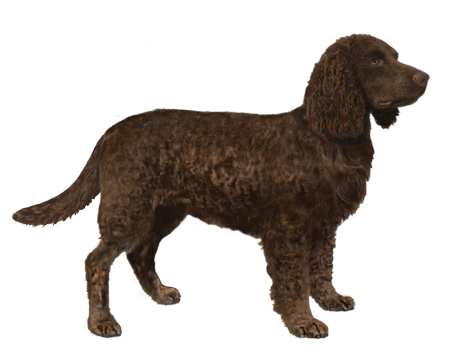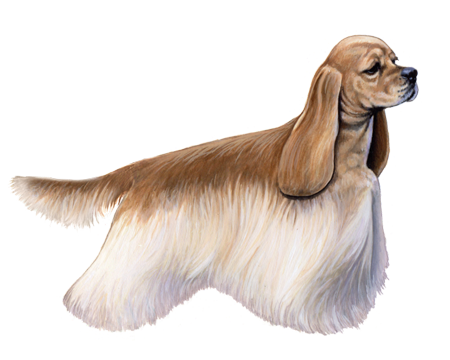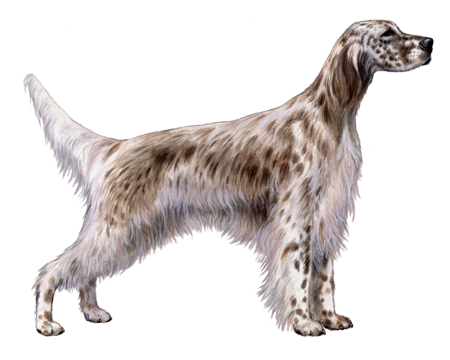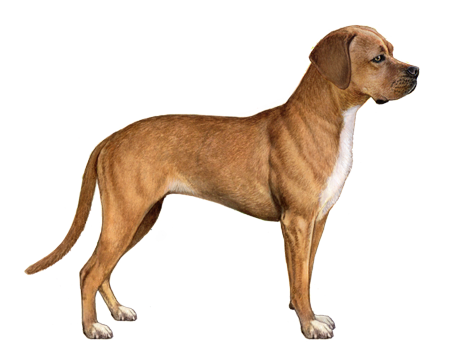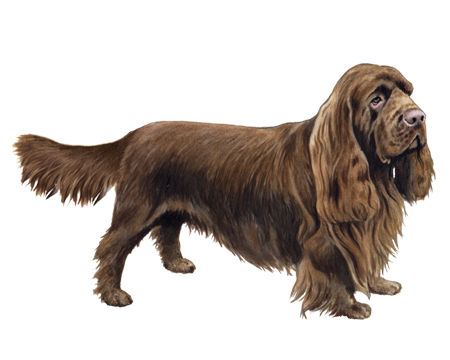
Welsh Springer Spaniel
The Welsh Springer Spaniel is an intelligent, energetic, and playful breed. Though these dogs were bred for their versatile hunting skills, it's their loyal, affectionate nature and stunning good looks that have captured hearts for centuries.
Interested in discovering if your dog is a Welsh Springer Spaniel?
Check out Wisdom Panel's DNA tests.
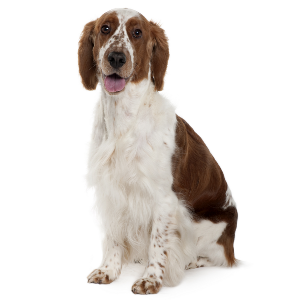
Welsh Springer Spaniel Traits
General Appearance
The Welsh Springer Spaniel is a medium-sized dog with a compact, well-muscled build and a gorgeous red and white coat.
Coat and Coloring
The coat of the Welsh Springer Spaniel is naturally straight and soft to the touch. It's also dense enough to provide protection from water, weather, and thorns. The breed's legs, chest, ears, and tails have various degrees of feathering.
Welshies have unmistakable red and white coats—with the white areas often flecked with red. The red can vary slightly in hue, but it's generally deep and vibrant.
Distinctive Physical Traits
Welsh Springer Spaniels have slightly domed skulls and straight muzzles. As such, their heads are shaped differently compared to other spaniels. Springer Spaniels' round, paddle-like feet enable them to swim powerfully.
Welsh Springer Spaniel Temperament
The Welsh Springer Spaniel is an energetic and easygoing breed. These good-natured, happy dogs are excellent with children and friendly towards other pets.
Welsh Springers thrive on human companionship. However, they tend to be suspicious of people they don't know—perhaps because they prefer to reserve all their affection and devotion for their families! If it were up to them, they'd never leave their family's side. For this reason, Welshies don't do well when left alone for long periods.


Welsh Springer Spaniel History
The Welsh Springer Spaniel has been around since at least the 14th century. But dogs resembling the breed show up in art and literature from 250 B.C. So, the Springer Spaniel may be one of the oldest breeds in existence.
Springer Spaniels came to Wales from Brittany, supporting the belief that the Welsh Springer Spaniel and the Brittany Spaniel share the same ancestry. And like all springers, the Welsh Springer Spaniel was bred to locate and flush out (or "spring") game from the bushes.
Because they worked in rough terrain and extreme weather, Springer Spaniels needed to be sturdy, agile dogs with great stamina and swimming ability. Breeders refined these traits during the Renaissance, and they are the standards still held today.
People initially referred to the breed as the "Welsh Spaniel" or "Welsh Cocker." When the dogs gained popularity in America in 1902, the breed earned its current "Welsh Springer Spaniel" name. But the owners who love them often call these dogs "Welshies."
Welsh Springer Spaniel Care
Nutrition
Welsh Springer Spaniels require a high-quality dog food that is age-appropriate—whether it's commercially manufactured or homemade (with a veterinarian's supervision and approval).
It's important to monitor the amount of food you give your Welsh Springer Spaniel. Reduce the portions or restrict calories if your pup gains weight. Also, remember that giving too many treats in addition to regular meals can contribute to obesity.
Grooming
Welshies are known for their beautiful coats (and the tumbleweeds of fur they leave behind when they molt). To keep your Welsh Springer Spaniel looking their best, brush them with a soft brush at least once a week—and more often during periods of seasonal shedding. If fur tangles or mats form, use a metal comb to work them out.
Because of their long ears, Welshies may be more susceptible to ear infections. For this reason, check and clean their ears regularly to prevent infections from developing.
Maintaining good dental hygiene is essential for any dog's long-term health. In addition to professional dental cleanings, establish an at-home care routine that includes regular teeth brushing.
Exercise
Welsh Springer Spaniels are high-energy dogs that need plenty of exercise and mental stimulation every day. If they get bored, they may find undesirable ways to entertain themselves. So, it's best to channel their energy into non-destructive activities.
For example, you can take your Welsh Springer Spaniel on long walks and hikes, or let them run free in a fenced backyard. Because they love to swim and play in the water, try throwing tennis balls or floating toys in the water for them to retrieve.
Welshies also enjoy dog sports that exercise their bodies and minds—such as field trials, hunting, tracking, agility, and competitive obedience.
Training
Though Welsh Springer Spaniels are intelligent and eager to please, they're also sensitive and known to have a stubborn streak. To train a breed with this temperament, use gentle handling techniques and lots of positive reinforcement. And to help them develop into well-mannered, well-adjusted dogs, socialize Welsh Springer Spaniels early and often.
Food can be an effective motivator for Welshies. During training sessions—or "teachable moments" that come up—use their favorite treats as rewards for desired behavior. For instance, offer them something tasty as a trade for inappropriate objects they've retrieved and claimed as their own (such as your new pair of slippers).
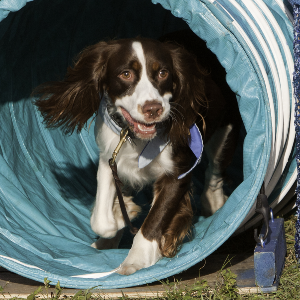
Welsh Springer Spaniel Genetic Health Conditions
-
Chondrodystrophy (CDDY) and Intervertebral Disc Disease (IVDD) Risk
Chondrodystrophy (CDDY) is a skeletal disorder characterized by shortened limbs and abnormal early degeneration of the spinal discs, or intervertebral disc disease (IVDD), which predisposes to disc herniation.
-
Factor VII Deficiency
Factor VII Deficiency is an inherited blood clotting disorder that results in excessive bleeding occurring after a severe trauma or surgery. The signs of the disease are typically mild but can vary in severity in different affected dogs.
Knowing if your Welsh Springer Spaniel is a carrier or at-risk for these conditions can help you and your veterinarian plan for your pup’s lifelong care. With Wisdom Panel™ Premium, you can get results for over 200 genetic health tests.
Breed Group
Sporting
The sporting group breeds are incredibly diverse in personality and appearance, but can be characterized as very sturdy. They were developed to work closely with people and in general have a very responsive nature and high intelligence.
Resources
https://www.akc.org/expert-advice/lifestyle/6-facts-welsh-springer-spaniel/
http://images.akc.org/pdf/breeds/standards/WelshSpringerSpaniel.pdf
https://www.welshspringerspaniel.club/the-breed/is-a-welsh-springer-for-you/
Reviewed July 26, 2020 by Cindy Elston, DVM, MPH




